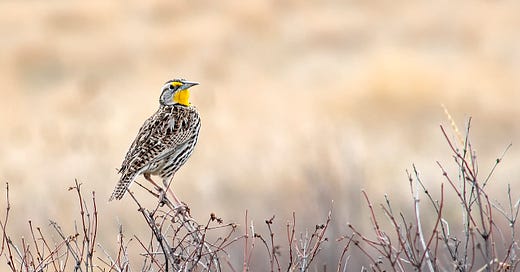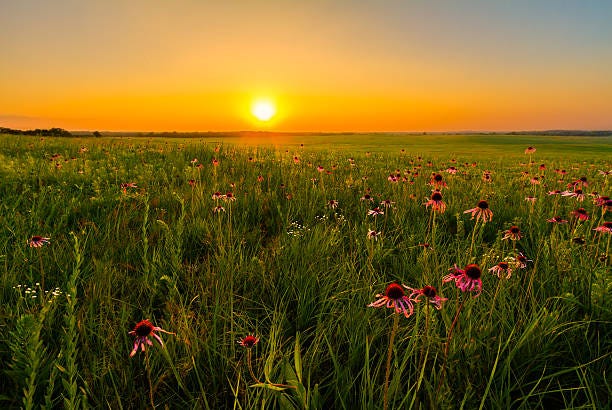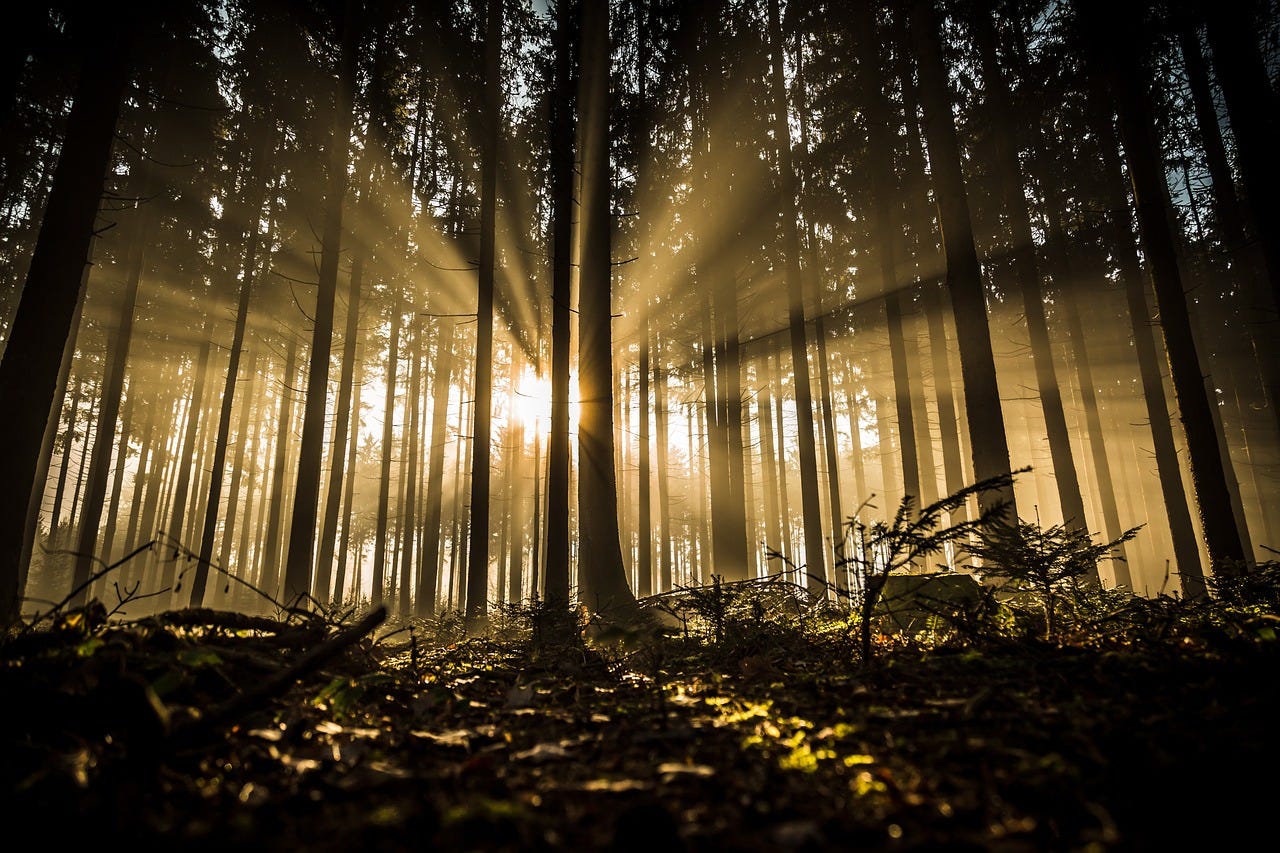People often talk about feeling connected to nature.
But we’re not connected to nature and we never can be.
We are nature.
The modern era has left far too many of us spatially, emotionally and even linguistically separate from this reality. Nature has become a concept. Somewhere we go when we are not engaged in our real lives. Something fundamentally other. And we end up living, leading and creating from a place of severance and illusion.
There’s an upside of course.
Much of our success as a species derives from our ability to free ourselves from nature and the feedback loops that constrain other species – things like disease, climate, scarcity, predation, darkness, distance, gravity, etc. We’ve done the same thing in the social domain too, trading the enabling constraints of oral culture, kinship networks and place-based ceremonial cycles for the adaptive advantages seemingly offered by written and digital knowledge systems, transactional alliances and transcendent philosophies that place humanity above and outside the rest of nature.
Real upsides. Profound costs and consequences.
Turning something into a concept or mental construct invariably distances us from its reality. We don’t perceive it clearly. We start to see and relate to the webs spun by our own minds – much of which are illusory. Deep spiritual traditions have always offered pathways to help individual practitioners awaken from the trance of such illusions and re-incorporate their consciousness within the broader fabric of creation.
But now the flourishing – and possibly even the very survival – of life as we know it on earth depends on us doing so as a species.
To awaken ecological consciousness at scale.
It’s a tall order, and on the surface, the prognosis doesn’t look great!
Systems thinking is often held up as a critical dimension of such collective awakening or cognitive transition. But the truth is, a lot of systems thinking is overly mechanical and static. It’s common to speak about the connections between the parts of a system. But as relational systems thinkers - like my sister Melanie Goodchild - remind us, such connections are not simply transactional exchanges between utility-maximizing agents.
They’re relationships!
And relationships are not just singular flows of information, goods, services and energy. They are shaped by factors like meaning, presence, paradox, context, alignment, commitments, responsibilities and complex causality – all of which change and evolve in fluid ways. In complex living systems, such relationships have texture and dimensionality across time, space and multiple other domains.
The thing that changes when we talk about systems change? Relationships. The nature or quality of relationships within a system are transformed in some way – thereby leading to the emergence of new systems patterns, behaviours or properties.
If you’re in the systems business, you’re really in the relationship business. It’s another reason why awareness and authenticity are so important.
I think we all understand this instinctively. But there is always a risk when we conceptualize something as ‘a system’ that we begin to over-identify with our mental construct and pay less attention to the nature and quality of the relationships at play. We can hold a sophisticated systems analysis or complexity lens but miss the reality of the relational dynamics…..dynamics that we ourselves are shaped by and, in turn, shape. Our perspective remains partial.
Because, as I’ve previously written, there’s no such thing as a system!
There’s just reality.
Systems are nothing more than our representations of some particular slice of reality.
This feels especially poignant right now.
I’d love to say that I’m watching people across the world coming to their senses, putting territorial disputes, short-term priorities, ideological polarization and narrow economic self-interest aside. People engaging in a thoughtful discussion of the complex existential challenges we face as a species and not only what we must do but who we must become to address them collectively. People yearning to actively participate together in building the kind of world they’d feel proud to leave their descendants.
On one hand, that’s probably more true than it’s ever been. I see signs of it emerging everywhere. It’s even possible we have begun to cross some kind of critical threshold or inexorable tipping point of collective consciousness. The hour before dawn is often the darkest and history suggests we are generally taken by surprise when socio-cultural systems tip in positive ways.
At the same time, you don’t need me to draw your attention to the horrifying spectacle of manipulative sociopaths and unripened boy-men with their hands on the levers of power that is currently playing out around the world.
It’s hard to say whether we’re standing at a bright evolutionary threshold or the beginning of a very long night.
And rather than try to analyze any of that, I’d like to share a story about a dear friend and generous mentor, Lakota Elder Chauncey Dupris, who I had the privilege of spending time with on the Cheyenne River Reservation back in the 1980’s and early 90’s.
It's a story about listening to the land.
As a youngster, Chauncey had run away from boarding school with his younger cousin Cal. Years later, Cal told me that their uncle sent him back and he later became an esteemed professor at the University of Lethbridge. But Chauncey never returned. Under the fierce tutelage and bear dreaming lineage of his grandmother, Sophie In-the-Woods, he later became a wiċasa wakan. It’s hard to translate from Lakota to English without losing the context, but it’s something like a holy man. Someone who hears, communicates with and mobilizes the unseen holy forces of the universe in service of his people. A medicine man.
Chauncey has been dead for some thirty years now but his tall frame comes clearly into focus now…gaunt, long hair unbound, mirth and wisdom gleaming from his single good eye. He stops outside the cabin where I’m staying in Cherry Creek as he does most mornings. “You awake?” he chuckles as I stumble into the car. It’s not yet five in the morning and the village is sleeping. He’s driving a battered red Ford Pinto with no windshield. Under the hood, there are engine parts held in place by pieces of rawhide and it never exceeds forty miles an hour. He turns and grins in the morning light. “Good car this” he says. “Hardly burns any oil!” We turn off the gravel highway and follow a faint track for several miles across the rough prairie grassland, eventually stopping at the base of a small hill. Today it turns out, we’re harvesting the roots of ičáhpe hú – echinacea.
The old man is walking along the base of the hill and he seems to be looking for something. I’ve learned enough at this point– entirely due to the patient kindness of my hosts - to not only refrain from peppering him with questions but to tone down the more intrusive gaze of my own inner observer. Un-learning might be a better way to say it.
Close the mouth, still the mind, open the heart and pay attention to what’s really going on.
It’s easy to mistake the desire to know with healthy curiosity, not realizing what a barrier such desire can be to deeper understanding. The most important things always seem to hover beyond our reach or slip between our fingers if we chase after them too hard or grasp them too roughly.
Eventually he stops in front one of the purple-fringed plants and speaks to it softly in Lakota. I could tell you about the ritual actions that followed but it’s not my place to do so – and it would miss the context from which they arose.
Kinship.
Chauncey explains that not only do these plants understand Lakota, their social structure shares important similarities with that of Lakota people. They have a particular way of living here on the prairie, a nation made up of self-organizing extended family networks – tiospaye in Lakota. It’s something like the Gaelic word clan. He had been speaking to the head of this particular tiospaye, not only seeking permission to harvest plants but, more importantly, doing so from one who had the right to grant it. You have to know who to talk to. The medicine depends on it. To Chauncey’s way of understanding, plants weren’t simply herbs with medicinal properties. They were part of a wildly inter-related socio-cultural ecology pulsing with animacy, sentience, sovereignty, agency, kinship, respect and reciprocity.
The medicine begins in and emerges from relationship.
I could say that of course Chauncey didn't use such elaborate language to describe things. And at one level that would be true. Like many Elders, he had a wonderfully simple way of putting things in English. But the old Lakota language is astonishingly sophisticated, crackling with a poetic vibrancy and multi-layered nuance my own bardic ancestors would surely recognize. The ability to speak about things without severance. To not only speak about complexity.
To speak with beauty, from complexity.
But such philosophical musings don’t intrude as we spend the morning gathering. Time flies by as Chauncey sits smoking menthol cigarettes and pointing out which plants to harvest. “There’s one!” he calls, laughing. “There’s another one! Good thing I’m here otherwise you’d be lost!” It’s an entrancing, timeless morning – overflowing with life, learning and laughter. A meadowlark lands in a nearby bush and begins to sing. I knew Chauncey had a special relationship with meadowlarks and I see him cock his head to one side, listening carefully. He frowns and his expression grows sombre. “There’s been an accident” he said, getting to his feet. “Three people hurt. They’re waiting for me at the house. They need me to go to the hospital”. We drive back, and there, parked in front of Chauncey’s house, is a car waiting to drive him to the hospital to help the three victims of a terrible road accident.
Just as the meadowlark had told him there would be.
Let’s just leave to one side all the interesting questions this raises - not the least of which is how did the meadowlark know? Maybe the echinacea told her. Because for Chauncey, there was nothing remarkable about any of this. It wasn’t supernatural or miraculous and there’s really nothing much to explain. It was daily reality for his grandmother and for hers before her. It’s just how things had always worked in the world to which he still belonged.
And that world still exists.
For those of you who grew up in Indigenous or earth-centered communities and cultures, this is nothing new. It is simply good manners and wise practice to speak to plants before you harvest them or to seek permission from bears before you enter their territory. To ask thunderstorms to move around your camp or listen to the advice of meadowlarks. The mindset where we do not experience ourselves as separate from the world around us remains an unexceptional human capacity for many contemporary people. And it is from this place of deep connectedness that right relationship unfolds. Our actions flow from a sense of love, belonging, connection, relationship, and reciprocity, rather than fear, rule-following, self-interest or a primarily intellectual awareness.
When people become untethered from reality for periods of time – or find themselves in situations that are too psychologically painful to comprehend - they might experience what psychiatrists sometimes call a dissociative state. It can be a terrifying experience. But dissociation seems so pervasive now that it is almost as if the modern era has normalized what is potentially a dangerous pathological condition.
Where do you turn when everyone around you has gone mad but nobody seems to notice?
Back to the earth.
The earth – more than ever – needs mature leaders. And those leaders – more than ever – need the earth. Leaders who can find and inhabit the niche that is their most authentic way of being in the world. A niche that is as much ecological as it is cultural or psycho-spiritual. Both the human and the wider earth community need you in your fullness.
According to Chickasaw writer and poet, Linda Hogan “there is a way that nature speaks, that land speaks. Most of the time we are simply not patient enough, quiet enough, to pay attention to the story.”
Over the coming days, much of the conversation in the human world is likely to be brimming with drama, reckless posturing, self-importance, simplistic linear causality, cycles of reactivity, delusional gloating, fear and disunity.
A veritable tidal wave of hubris and horseshit.
But something beautiful is emerging below the visible horizon line my friends. And it’s going to be much easier to perceive and participate in if you’re listening to the land with the kind of patient, quiet attention that Linda Hogan writes about. It’s some kind of counter-balance to the overwhelming anthropocentric cacophony. Some means of taking perspective. Some way of un-hijacking our own attention.
It might seem like a strange invitation. But whether you view it as an allegory or the literal truth, the earth is speaking to us and has some important things to say.
Let me be clear. I’m not advocating for a romantic return to some kind of Edenic mythological past. This blog is a metamodern project; I’m certain that we cross the perilous threshold forwards and together or we do not cross at all. But nothing is more perilous than unlimited power wielded by, and in service to, the unripened, severed self. As we migrate online, as the distinctions between the digital and the analogue worlds grow increasingly blurred and as we develop exponentially greater technological powers with which to bend reality to our will, it’s going to have to be balanced by a commensurate development of our deepest humanity – along with some appropriate boundary conditions - if we are to midwife a flourishing future.
And that will require a living connection to the wild earth.
So, over the coming days and weeks, I respectfully invite you to take a little time to tune out the craziness and listen as deeply as you dare to the wellsprings of the wild world – wherever and however they are whispering to you. And then to participate from that place of your deepest wholeness and connectedness - your love and wisdom, your courage and truth - in the dance of the coming days.
I’ll see you on the dance floor!
Julian
Ps. If you’re interested, I recently published this article about awakening, wild nature and leadership for the Humanistic Management Journal.







I shared the story of the meadowlark with my 15 year old on a walk through our neighbourhood. It helped her break out of her loops of concern and frustration about classroom politics. We both allowed some fresh wonder to come in about what the plants around us might be saying...
A beautiful woven web of experience. You're absolutely right- the relationships must be experienced as a living reality, not a rationalized network.